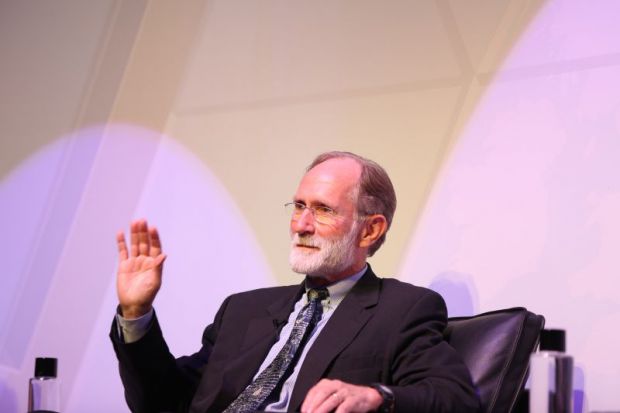Nobel laureate Peter Agre has claimed that universities’ greatest challenge over the next decade is to ensure that young scholars do not lose faith in academia.
Speaking at the Times Higher Education World Academic Summit in London, Professor Agre said that funding is now “more difficult to get” and that although his generation of scientists has been successful, “the next generation may not” be. The processes involved in winning funding and conducting research are also more “onerous”, he added.
When asked what he thought was the biggest single challenge facing researchers in the next 10 years, Professor Agre said: “I’m afraid that younger people will lose confidence and lose heart and [decide] that there may be easier ways to support the family.”
Professor Agre, Bloomberg distinguished professor and director of the Johns Hopkins Malaria Research Institute, who shared the Nobel Prize in Chemistry in 2003, added that researchers now spend “large fractions of their time churning out [funding] applications”.
“Yes, it’s a good thought process to organise your research, but there’s a point when you have to actually do the research. It’s like all planning and no fishing,” he said. “Fishing is why people want to get into this, to make discoveries. I am most fearful about younger scientists who haven’t got into this far enough to know that it’s the greatest life possible.”
He added: “Let us be unconstrained, and I think great things will happen.”
During a panel discussion on the future of world-class research, Professor Agre also shared his experience of working as a researcher under several different US presidential administrations.
He said that he was a finalist for the position of director of the National Heart, Lung, and Blood Institute 13 years ago while George W. Bush was running for re-election as US president.
But Professor Agre, who volunteered that had “a bad habit of speaking my mind”, decided to withdraw his candidacy because he thought that he might “get into trouble” if Mr Bush was re-elected.
Professor Agre said that Anthony Fauci, the director of the National Institute of Allergy and Infectious Diseases, told him that he was making a “big mistake”.
“Governments come and go, administrators come and go; but the science goes on [he told me]. ‘Don’t be political, focus on the science.’ That was good advice,” he said, although he admitted that he did not follow it at the time.
“Science goes on,” Professor Agre continued. “[Donald] Trump is president now, but who knows [about the future]?”
Prabha Kotiswaran, reader in law and social justice at King’s College London, who also spoke on the panel, said that she is kept awake at night by the sense that “academics are getting left behind in dealing with global challenges”.
She said that governments and capitalist financiers are now “setting the agenda for how we solve the world’s problems”, but such organisations and people are “not used to the kind of rigorous research” that takes place in academia.
Register to continue
Why register?
- Registration is free and only takes a moment
- Once registered, you can read 3 articles a month
- Sign up for our newsletter
Subscribe
Or subscribe for unlimited access to:
- Unlimited access to news, views, insights & reviews
- Digital editions
- Digital access to THE’s university and college rankings analysis
Already registered or a current subscriber? Login








